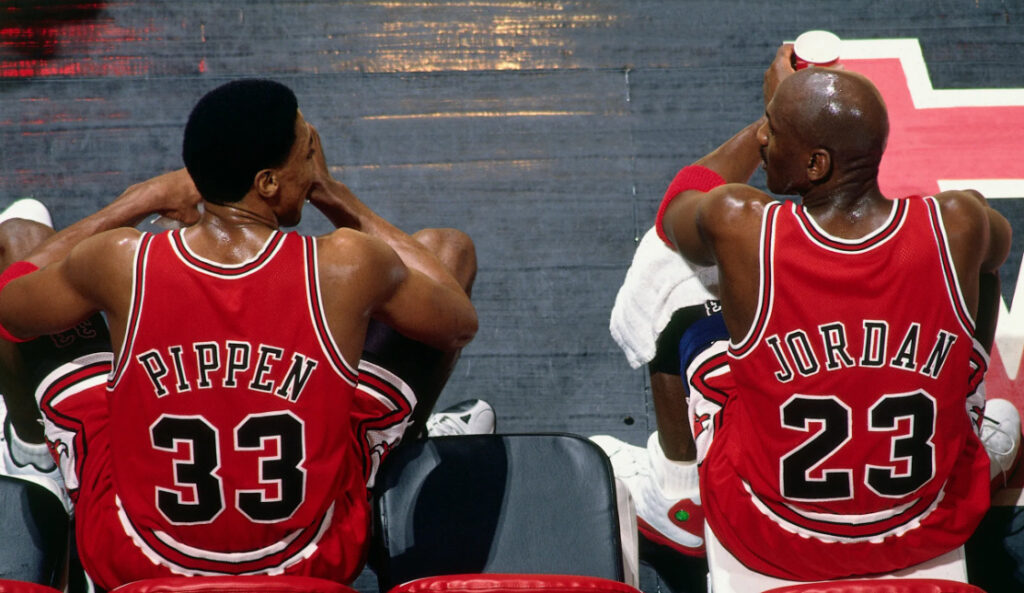
It’s no secret that team chemistry is an essential part of any successful NBA team. After all, it’s the trust and bond between players that can make or break a season. But what exactly is team chemistry? It’s more than just putting on the uniform and hitting the court; it’s about creating lasting relationships that will help your team achieve peak performance and successful results.
In this article, we’ll explore the importance of team chemistry in the NBA, from proven strategies for developing camaraderie, to dealing with bullying, to obtaining effective leadership skills for good team communication. We’ll also look at how coaches can create a winning culture, setting goals and expectations, building relationships, and utilizing cohesion techniques to maximize team success.
Definition of Team Chemistry
Team chemistry is a special thing that helps a basketball team work together to achieve its goals. It’s about the relationships between players, coaches, and management, as well as the values and attitudes that make up the team’s culture.
Team chemistry is incredibly important for any NBA team’s success. Good chemistry can take a good team to great heights, while bad chemistry can be a real game-changer.
With great team chemistry, players are more likely to prioritize the team’s success over their own, allowing everyone to work together to achieve something bigger than themselves. Good chemistry also helps teams stay strong in tough times and creates a real sense of togetherness between players.
Establishing a Winning Culture
A winning culture is a set of values, attitudes, and behaviors that help a team or organization succeed and be excellent. It’s about being accountable, working hard, working together, trusting each other, talking, and showing respect. It’s important to set goals and expectations for a team so we can have a clear vision of what we’re working towards. This helps give everyone a sense of purpose and motivation.
Some ways to set goals and expectations for a team include crafting a mission statement, coming up with specific and measurable objectives, and assigning deadlines for those objectives. Accountability is key for creating a winning culture, as it makes sure everyone takes responsibility for their actions and is committed to the team’s goals. It also helps build trust and respect between teammates.

Whether it’s a basketball team trying to make it to the NBA Finals or a tech company striving for success, team chemistry is essential for achieving success. Establishing a winning culture requires the players and coaches to work together, follow a game plan, and trust each other. It’s also important to have a star player who can lead by example and motivate the team, as well as strong leadership that can help bring the team together and create an environment of trust and respect.
Through accountability and goal-setting, teams can create a culture of winning that is focused on team success, not individual glory. By following these strategies, teams can strive for excellence and reach their ultimate goal – the NBA Finals or whatever the team’s success may be.
Building Relationships
It’s important to build relationships in the NBA as it can help with team chemistry, communication between teammates, boost confidence, and lead to better performance on the court. Forming relationships can boost team chemistry by building trust, enhancing communication, and unifying teammates.
A coach needs to be a good teacher, really get to know their players, and figure out how to reach them. They should build a trusting relationship, so the player feels safe and supported. To get closer to their players, coaches can get to know them on a personal level, talk openly, give helpful advice, and be understanding.

Building relationships between the players and coaches is essential in order for the team to be successful. If the players understand and respect each other, they will be able to play better as a team and support each other on and off the court. Communication between players and coaches is key to team success, as it helps create a better atmosphere for the team to thrive and grow.
The team leader should be the one that sets the tone for the team and makes sure that everyone is heard and respected. A good relationship between the coach and the players is the difference between a successful season and a disastrous one.
The importance of building relationships goes beyond the court. Team meetings, practices, and team dinners are all great opportunities for the players and coaches to get to know each other better. A strong bond between the players and coaches creates a sense of security and unity, which can be beneficial for the team’s success. It also helps the players stay motivated and focused on the game. The relationships between the players and coaches are one of the most important factors that contribute to the team’s success.
Developing Cohesion
Building team chemistry is an essential part of fostering a winning culture within a team. In practice, coaches can help build team chemistry by assigning partners for drills, scrimmages, and plays. This helps players become more comfortable with each other and get to know their teammates better. As well as pairing up, coaches need to identify player roles and make sure everyone knows their place. This way, everyone is clear on what they are expected to do and the team can work together more effectively.

In addition to the on-court activities, team bonding activities are just as important for developing cohesion. Going for a meal, a movie night, or a camping trip can all help teams bond and grow closer. It’s also important for coaches to recognize and reward players who do all of the little things like getting 50-50 balls and rebounding. This helps everyone feel valued and appreciated.
Utilizing Leadership
Leadership is key for promoting team chemistry and unity. Leaders have the power to bring everyone together, set a common goal, and help work out any issues between team members. In order to maximize a team’s success, leaders should be focused on establishing a positive team atmosphere, setting a good example, and encouraging open communication and collaboration.
Leadership is also important for resolving conflicts within the team. Leaders need to get everyone to talk openly, really listen to everyone’s perspectives, and work together to find a solution that works for everyone. This can help build trust and understanding between team members, which is essential for team chemistry.

Finally, using leadership to boost team morale is important because it helps bring everyone together and gives them a shared goal, which can lead to better results and more wins. Leadership can also help foster a sense of accountability, as team captains or head coaches can help keep everyone motivated and on track. Coaching staff can also be utilized to provide guidance and help refine talent to a higher level. Having regular team meetings and discussions can also help to create a sense of unity and togetherness.
Avoiding Bullying
Bullying can have a devastating effect on team chemistry, player performance, and mental health. It can create a hostile environment where players are unable to do their best and can even lead to serious mental health issues. To prevent bullying within a team, it is important to set clear expectations for how people should act, create a positive team atmosphere, and encourage everyone to talk openly.

If bullying does occur, it is crucial to deal with it quickly and get the people involved and their parents in the same room if necessary. Everybody must be aware that bullying is not tolerated in the locker room and will be dealt with swiftly.
By creating a culture of respect, kindness, and understanding, teams can foster a strong sense of team chemistry and ensure that players are able to perform to the best of their abilities.
The Evolution of Roster Chemistry in Modern NBA
In recent years, the NBA has seen a seismic shift in roster construction. The era of super-teams and frequent player movement has posed new challenges to building and maintaining team chemistry. High player turnover rates, driven by free agency and blockbuster trades, mean that teams often have limited time to gel.
Yet, some franchises have managed to navigate this landscape successfully. They prioritize continuity, recognizing that a stable roster can lead to better on-court synchronization, even if it lacks multiple superstars. This approach underscores the belief that the sum can indeed be greater than its individual parts when players share a unified vision and trust.
Adapting to the New Normal
The modern NBA, with its emphasis on player empowerment and freedom of movement, requires teams to be agile in building chemistry. Coaches and management must foster an environment where new additions feel integrated quickly, and players are encouraged to communicate both on and off the court. Regular team-building activities, open dialogue sessions, and inclusive leadership are crucial in this era.
As the league continues to evolve, the franchises that prioritize and adapt to the nuances of team chemistry are likely to find consistent success, proving that while talent wins games, teamwork and intelligence win championships.
Summary
At the end of the day, team chemistry is the foundation for any successful franchise in the NBA. It’s what separates championship teams from those who make it to the playoffs but are unable to advance. Even though it can be difficult to foster an atmosphere of true unity and harmony, understanding each players’ role, as well as developing relationships between coaches and players, should be the first steps taken.
Leadership is also necessary to hold the team accountable and instill camaraderie. Lastly, fostering a culture of respect towards each other is the key to avoiding conflict and bullying, bolstering success on and off the court.
With the right strategies and clear understanding of importance, team chemistry can be integral to any franchise’s ultimate success.
Frequently Asked Questions
Why is team chemistry important in sports?
Having a strong team chemistry is vital for any successful sports team. It can positively contribute to achieving goals, create better coordination among players and help develop essential skills within the team.
Without strong team chemistry, it’s much harder to work together cohesively and take advantage of every team member’s unique talents. Therefore, team chemistry is an essential ingredient for any sports team that wants to perform at its peak.
Which NBA team has good chemistry?
It’s clear that the San Antonio Spurs have shown great chemistry over the past decade. The combination of talent, commitment, and longevity allowing them to stay together has led to a remarkable level of success.
What are the benefits of team chemistry?
Team chemistry leads to higher productivity, improved communication, increased morale and trust, better collaboration and unique perspectives that are only found in a collective.
What does team chemistry mean in the NBA?
Team chemistry in the NBA is all about creating an environment where players are working together to reach a common goal. It’s about understanding both the strengths and weaknesses of each teammate and finding ways to make their collective abilities shine on the court to win games.
Good team chemistry enables players to form strong relationships built on trust and mutual respect, allowing them to achieve their best possible results.
Sources
1. wcbe.org – Why Team Chemistry is better than having Star Power (NBA Edition)
2. coachesinsider.com – Team Chemistry and Leadership
3. blazersedge.com – What is Team Chemistry in Professional Sports?
4. breakthroughbasketball.com – 5 Proven Ways to Build and Maintain Team Chemistry Over The Course Of A Season
5. sportskeeda.com – The role of team chemistry in building a successful NBA franchise
6. basketballforcoaches.com – 4 Ways to Develop Fantastic Team Chemistry
7. benchboss.ai – Building Trust: Team Chemistry 101





